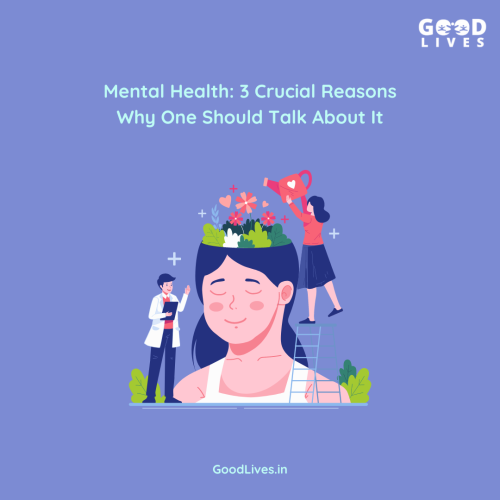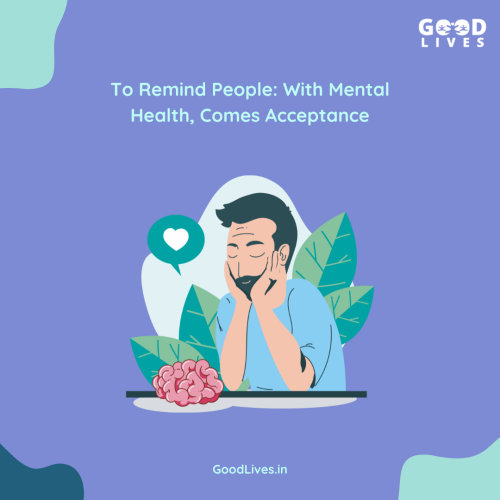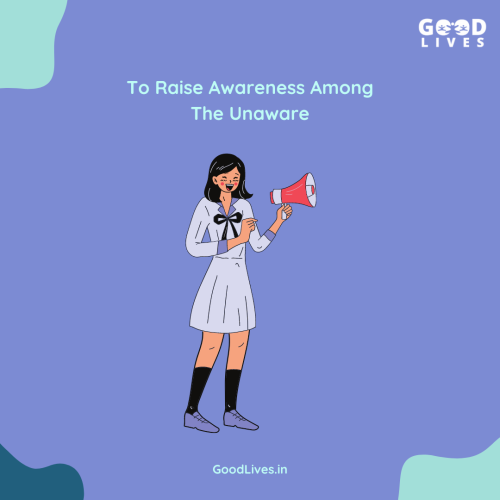
We schedule meetings, workouts, and coffee dates—but when was the last time you penciled in time for your mental well-being or just spoke about it?”
We do talk about mental health more often now, but how far have we come ahead with this ‘still very stigmatized’ topic? GoodLives, as a mental health startup, tries different ways to encourage and inculcate the choice of taking care of your mental wellness and, most importantly, talking about it as openly and richly as possible.
HAVE YOU STARTED TALKING ABOUT MENTAL HEALTH?
One might ask, “Why is it so important to talk about it?”
1. To Remove The Stigma That Has Forever Been Attached To It

On the forefront, the reason why we should talk about it is to remove the stigma that has forever been attached to it. It is to destigmatize people’s behavior and attitude towards mental health. It is to make peace with the fact that humans have a mind and a heart that thinks, feels, and processes over ten different emotions daily, and most of the time, they are not very happy emotions, not very comforting feelings which is completely okay.
It is to make a society where people don’t think twice before booking a therapy session and do not hesitate before sharing something that is hurting them a lot.
2. To Remind People: With Mental Health, Comes Acceptance

It is to remind people that with mental health, comes acceptance. Once you start accepting your negative emotions, once you start dealing with your stress, anxiety, and the daily panic that most of us go through in a natural way which is very accepting of yourself, we can lead to a world where all of us get a lot more peace and comfort and a world which doesn’t shy away from talking about it and having a healthy mind.
3. To Raise Awareness Among The Unaware

Do your parents randomly come to you and talk to you about how their day was? About how your father had been working the whole day without any breaks and experienced a lot of frustration due to the workload. About how your mother wanted to just lie down the whole day, watch movies and just chill without any burden of cooking?
Very rarely, right? Maybe never? Since our childhood, we have always been taught to not have unhealthy food, to exercise, and to do yoga regularly so that we are physically fit, but not once are we told that mental fitness is equally important.
It is critical to educate those who haven’t even considered the possibility that caring for your mental health is a real responsibility. And the only way to bring up this important aspect of their lives is to have a conversation with them about mental health.
This is your cue to sit down with your family and friends and explain that stress and anxiety are something that should be dealt with rather than ignored. It’s high time we stop treating headaches only as physical ailments and start treating them as a sign of mental exhaustion as well.
The first step to prioritizing our mental health is to talk about it, and if GoodLives can do it, you can too. Inspired by this, GoodLives recently conducted a campaign. In an attempt to not overcomplicate the topic and just to simply put out a friendly reminder for people out there, they collaborated with many professionals from different fields and encouraged them to put out a picture of themselves on a common template with the message- I talked about mental health, #youcantoo.
More than 100 passionate advocates participated and we could reach 30,000 people which truly makes a lot of difference and much more is yet to come. GoodLives continues to work on making mental health a dining table conversation where each one of us can come out and speak and share whatever we want to. GoodLives Is Starting the Conversation and #youcantoo. So, do we have a deal here?
If you are having difficulties in dealing with your mental health, try talking to a mental health professional today!
0 Comments